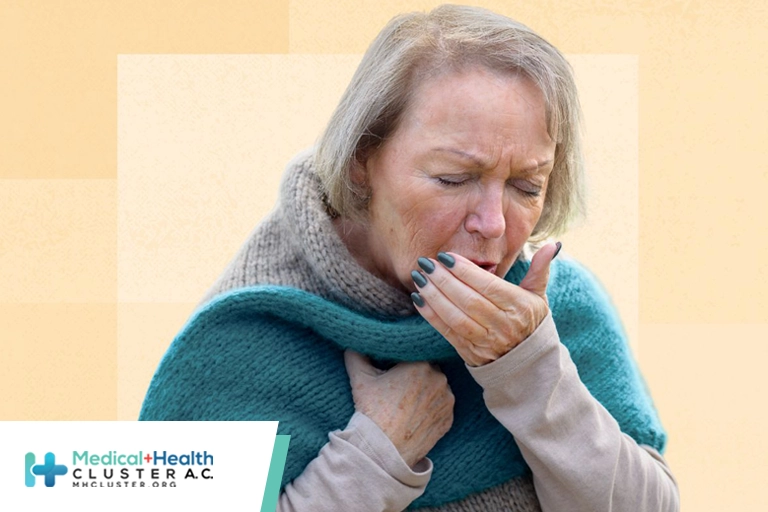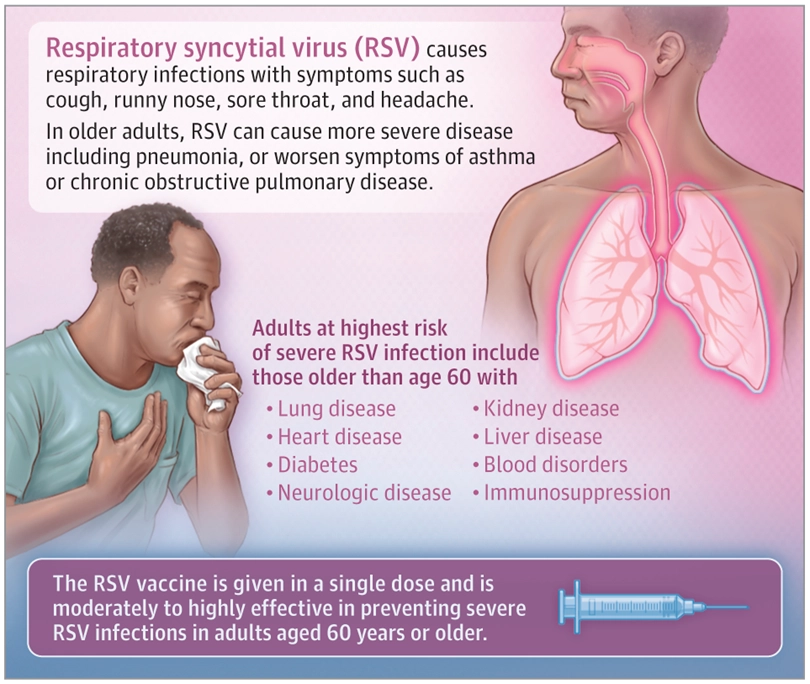En atención a la creciente preocupación sobre la confianza en...
Leer más
RSV Infection in Older Adults


Respiratory syncytial virus (RSV) causes respiratory infections in humans.
What Are the Symptoms of RSV Infection?
In most people, RSV causes mild cold-like symptoms of cough, runny nose, sore throat, headache, decreased appetite, and fever that typically last less than 5 days. However, in older adults, RSV can cause more severe disease such as pneumonia, or can worsen respiratory diseases, including asthma or chronic obstructive pulmonary disease (COPD).
Timing of RSV Infections and Incidence of Severe Infection
RSV infections typically begin in the fall and peak during the winter. Each year in the US, RSV causes about 60 000 to 160 000 hospitalizations, and up to 10 000 deaths in adults older than 60 years.
Risk Factors and Spread of RSV Infection
Adults at highest risk of severe RSV infection include those older than 60 years with any of the following conditions: lung disease (such as COPD and asthma), heart disease (such as heart failure and coronary artery disease), diabetes, neurological diseases, kidney disease, liver disease, blood disorders, or immunosuppression. People who live in a nursing home or long-term care facility are also at high risk of severe RSV infection.
RSV spreads from person to person through the airborne route when someone coughs or sneezes, or by direct contact through the nose, mouth, or eyes after a person touches an infected surface. People with RSV can spread the virus for up to 2 days before they feel sick and may be contagious for 3 to 8 days after they develop RSV symptoms.
Measures to Reduce Risk of RSV Infection
RSV infection can be decreased if people wash their hands, cover their coughs and sneezes, and avoid close contact such as kissing, shaking hands, and sharing drinking glasses with others. Disinfecting surfaces and encouraging individuals with cold-like symptoms to remain at home also decrease the risk of RSV transmission.
Vaccination for RSV
The US Food and Drug Administration (FDA) recently approved 2 new RSV vaccines, Arexvy and Abrysvo. Both vaccines are moderately to highly effective in preventing severe RSV infections in adults aged 60 years or older.
RSV vaccination is currently given by a single injection, although studies are ongoing to determine if additional booster doses should be recommended. RSV vaccine can be given at the same time as other vaccines, such as influenza or COVID-19. Individuals with a minor illness, such as a cold, can be vaccinated, but RSV vaccination should be delayed for those who are moderately or severely ill. RSV vaccine should not be given to people with a prior severe allergic reaction to any component of the vaccine.
The Centers for Disease Control and Prevention (CDC) recommends that adults older than 60 years discuss RSV vaccination with their clinician. People who are at high risk of developing severe RSV infection based on their age and medical conditions should strongly consider receiving an RSV vaccine.
After RSV vaccination, people may have pain, redness, and swelling in the area where the shot was given, and some individuals may experience fatigue, fever, headache, nausea, diarrhea, and muscle or joint pain. Severe allergic reactions to RSV vaccines are very rare.
For More Information
-
Centers for Disease Control and Prevention
www.cdc.gov/vaccines/hcp/vis/vis-statements/rsv.html
To find this and other JAMA Patient Pages, go to the Patient Information collection at jamanetworkpatientpages.com.
Source: https://jamanetwork.com/journals/jama/fullarticle/2809541?guestAccessKey=1fb5d61c-7323-42ba-84fd-bbf36d4db19c&utm_source=fbpage&utm_medium=social_jama&utm_term=11423428931&utm_campaign=article_alert&linkId=237614966&fbclid=IwAR3VXp2TbMVkBzW-9NbOzcGZIrcxAg_-4BEnvDeyclS2Rpj0qWrIYz4mcDY




